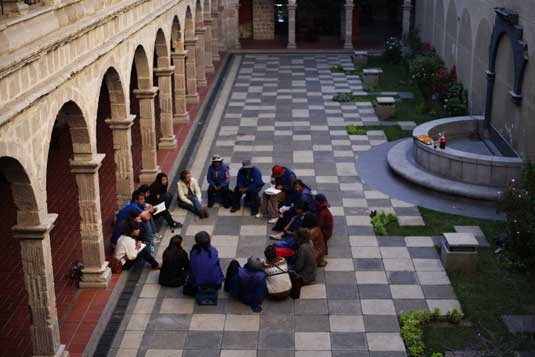Led by Temple professor, ‘Guerilla altruism’ group helps underserved at home and abroad
It’s nearly dawn in Bolivia, and a guerilla operation is underway in the dimly lit streets of La Paz. Rather than grenades and guns, however, these warriors are armed with research and sketchbooks — implements of choice for American students, artists and educators on a humanitarian mission.
They call their work “guerilla altruism,” an idea conceived by Tyler School of Art Assistant Professor of Architecture Scott Shall that challenges young humanitarians to create unorthodox solutions to global problems. Influenced by the ideas of the Argentine guerilla leader Che Guevara and a diverse list of modern revolutionaries, Shall challenges his students to use the improvisational techniques of guerilla warfare and the humanitarian spirit of altruism to design strategies for improving the lives of underserved populations.
On their latest six-week mission to Bolivia, Shall and his team worked to develop business strategies and sustainable architectural structures to aid a group of boys who live in poverty on the streets of La Paz. Known as the lustrabotas, or “shoeshine boys,” the young men have little or no access to education and are often sole providers to large, extended families. Shall and his crew have designed small-scale devices, deployable classrooms and mobile school platforms as educational resources that might help the shoeshine boys rise above their exploitative, low-wage jobs.
“(We hope) to help students and designers to more sensitively engage the unique dynamic found within the informal communities that represent the fastest growing urban condition in the world,” said Shall. “The work is meant to influence and get people to think of long-term projects that will change the issues these communities face for the better.”
The projects are an outgrowth of a Temple general education course titled “Guerilla Altruism: A Mini-Manual of Subversive Activism,” which highlights the parallels between the concept of architecture and power. Each class looks at solutions to common global problems such as water pollution, homelessness, poverty and educational disparities. Students are also challenged to enact smallscale interventions that help a disadvantaged person or community group in or around Temple.
“In each case, the work utilizes a creative reapplication of undervalued materials and resources to address each community’s unique circumstance and develop projects that can be possessed and evolved by the members of that community for years to come,” said Shall.
In another guerilla campaign, photojournalism major Saleem Ahmed helped a group of young men in a La Paz community center begin a small postcard business.
“My Spanish is not perfect,” said Ahmed, who also studied abroad in Japan. “But even with the language barrier, I learned that kids across the globe are the same. Putting a smile on their faces is all that matters.”
